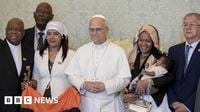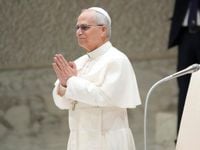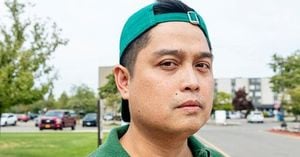On August 23, 2025, history took a decided turn for the Chagos Islands as Pope Leo XIV publicly celebrated what he called a "significant victory" for displaced Chagossians and a powerful message for the world. The Vatican audience, which brought together a delegation of Chagossian refugees—some of whom had spent decades in exile—marked a symbolic high point in a struggle stretching back more than half a century.
The cause for celebration: a treaty signed in May 2025 between the United Kingdom and Mauritius, which will see the UK transfer sovereignty of the Chagos archipelago to Mauritius. Yet, the agreement is far from simple. While Mauritius will gain official sovereignty, the US and UK are set to continue operating their strategic military base on Diego Garcia, the largest of the islands, for an initial period of 99 years. According to BBC News, the UK will pay Mauritius an average of £101 million annually over the duration of the lease—amounting to nearly £10 billion over the agreement’s full term.
Pope Leo, the first American pope, did not mince words about the importance of the deal. Speaking in French to the assembled refugees, he declared, “The renewed prospect of your return to your native archipelago is an encouraging sign and a powerful symbol on the international stage: all peoples, even the smallest and weakest, must be respected by the powerful in their identity and rights, in particular the right to live on their land; and no one can force them into exile.” He expressed hope that Mauritian authorities would ensure the refugees’ right to return, and pledged the support of the local Catholic Church in this endeavor (NationalWorld).
For the Chagossians, this moment comes after decades of displacement. In the late 1960s and 1970s, the UK forcibly evicted around 2,000 islanders to make way for the construction of the UK-US military base on Diego Garcia. Many were resettled in Mauritius and the Seychelles, while others accepted an invitation to settle in England—most notably in Crawley, West Sussex (BBC News).
The treaty is not yet in force. It awaits approval by both the UK and Mauritian parliaments before it becomes law. The agreement also establishes a 24-mile buffer zone around Diego Garcia, where no construction can occur without UK consent. Foreign military and civilian forces are barred from the other islands in the archipelago, and the UK retains a veto over access to the islands (BBC News).
While many have welcomed the deal, controversy abounds. UK opposition leaders and some Chagossians now living in the UK have criticized the agreement. The Conservative Party branded the deal “an act of national self-harm,” warning that it leaves the UK “more exposed to China” due to Mauritius’s international ties. Mark Francois, the Tory shadow Armed Forces minister, remarked to The Telegraph, “With great respect to the Holy Father, as I understand it the Vatican are not proposing to cover the £35bn cost to rent back islands and a vital strategic base, which already belong to us in the first place. That absurd cost would fall squarely on UK taxpayers, irrespective of their religion.”
Sir Keir Starmer, the UK Prime Minister, has staunchly defended the deal. He argued that, without the agreement, “the legal situation would mean that we would not be able to prevent China or any other nation setting up their own bases on the outer islands or carrying out joint exercises near our base. No responsible government could let that happen.” Starmer maintains that the arrangement is imperative for the UK’s national security and for maintaining the strategic importance of Diego Garcia (BBC News).
The financial details of the deal have also raised eyebrows. Initial government estimates put the cost at £3.4 billion, but documents obtained via the Freedom of Information Act suggest the true price tag could reach £35 billion over the course of the 99-year lease. The agreement includes the creation of a trust fund to benefit the Chagossians and grants Mauritius the right to implement resettlement programs on the islands other than Diego Garcia. However, it does not require the resettlement of residents, and some displaced islanders fear that returning to their birthplace could become even more difficult once Mauritius takes control (Daily Mail).
Philippe Sands, an international lawyer representing Chagossians, told The Telegraph that Pope Leo’s words “offered clear support for the urgent return of Chagossians to the islands from which they were deported.” The Pope also singled out Chagossian women for their role in peacefully asserting their right to return home (NationalWorld).
The international context is just as complex. Mauritius has long contested the UK’s claim to the archipelago. In 2019, the International Court of Justice issued a non-binding opinion stating that the UK had unlawfully separated the Chagos Islands from Mauritius during the decolonization process. The United Nations has also called on the UK to return the islands. The late Pope Francis, during a visit to Mauritius in 2019, urged the UK to heed the UN’s call and return the territory (NationalWorld).
The treaty sets out that Mauritius is free to implement resettlement programs on the islands, but critics point out that there is no legal requirement for the return of the original inhabitants. Two women born in Diego Garcia mounted a last-minute legal challenge to the agreement in May 2025, but the UK High Court dismissed their case (BBC News).
For many Chagossians, the deal is a bittersweet victory. While it brings the long fight for recognition and justice to an apparent close, it leaves unresolved the practicalities—and the politics—of actual return. Some fear that, despite the rhetoric, the hurdles to resettlement remain daunting. Others see the agreement as a new beginning, a chance to reclaim their homeland and restore what was lost decades ago.
As the world watches, the fate of the Chagos Islands and their people hangs in the balance. The treaty’s final approval by both parliaments will determine whether the Pope’s words of hope and justice translate into real change for those who have waited so long for a homecoming.





